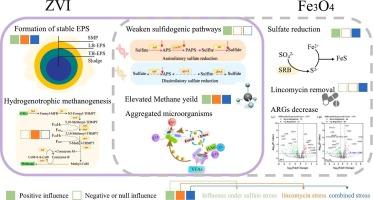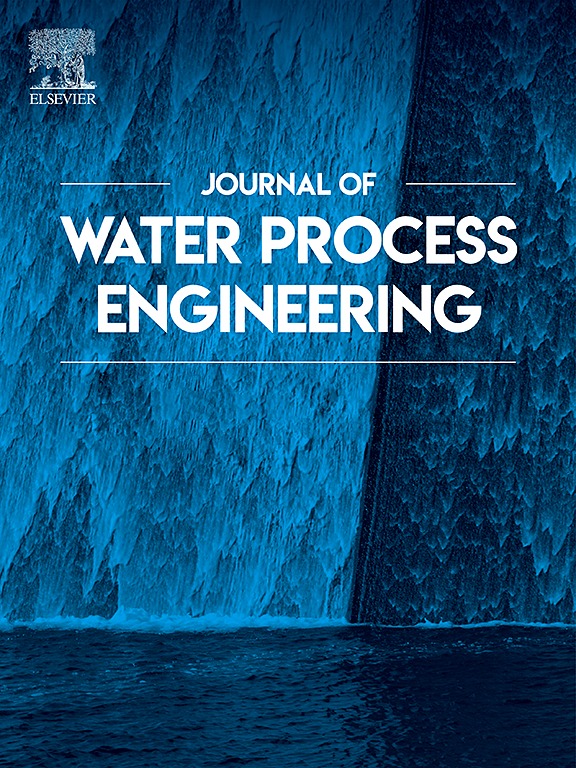零价铁和磁铁矿对减轻厌氧消化过程中硫酸盐和林可霉素压力的影响:微生物演替和抗生素耐药基因的去除
IF 6.3
2区 工程技术
Q1 ENGINEERING, CHEMICAL
引用次数: 0
摘要
本研究探讨了零价铁(ZVI)和氧化铁(Fe3O4)对硫酸盐、林可霉素和混合胁迫厌氧消化的促进作用。在不同的胁迫条件下,ZVI 和 Fe3O4 都能提高甲烷的累积产量。在硫酸盐胁迫条件下,ZVI 显着提高了最大甲烷产生率,达到 1.8 ± 0.1 mL/h,是对照组的 2.25 倍。在联合胁迫条件下,Fe3O4 对林可霉素的降解性能优越,去除率为 56.7 ± 1.3 %。此外,ZVI 还促进了辅酶 F420 的形成和养氢型甲烷生成。在微生物群落演替方面,ZVI 和 Fe3O4 富集了 Mesotoga 和未分类的__f__Thermotogaceae,这两种微生物都有利于丙酸盐的降解。铁基材料也同样富集了亲氢甲烷菌,特别是在引入 Fe3O4 后。通过元基因组分析发现,在不同的胁迫条件下,ZVI 和 Fe3O4 上调了pliA 和 chpA 等富氢甲烷发生基因和种间直接电子传递基因。此外,与 ZVI 相比,Fe3O4 在减少抗生素耐药基因方面的潜力更大。总之,本研究证明了 ZVI 和 Fe3O4 在高硫酸盐/林可霉素条件下增强厌氧消化的潜力,并为进一步的研究提供了基础。本文章由计算机程序翻译,如有差异,请以英文原文为准。

Effect of zero-valent iron and magnetite on mitigating sulfate and lincomycin stress in anaerobic digestion: microbial succession and antibiotic resistant genes removal
This study investigated the enhancement performance of zero valent iron (ZVI) and Fe3O4 on sulfate, lincomycin and combination stressed anaerobic digestion. The cumulative methane yield were both promoted by ZVI and Fe3O4 under different stressed conditions. ZVI significantly elevated maximum methane production rate to 1.8 ± 0.1 mL/h under sulfate stress, which was 2.25-fold of control group. Fe3O4 revealed its superior performance on lincomycin degradation with a removal efficiency of 56.7 ± 1.3 % under combined stress. Besides, the formation of coenzyme F420 and hydrogenotrophic methanogenesis were stimulated by ZVI. Regarding microbial community succession, Mesotoga and unclassified_f__Thermotogaceae were enriched by ZVI and Fe3O4, both of which profited propionate degradation. Iron-based materials similarly enriched hydrogenotrophic methanogens, especially with introduction of Fe3O4. Insight into metagenomic analysis, genes encoding hydrogenotrophic methanogenesis and direct interspecies electron transfer, such as pliA and chpA, were up-regulated by ZVI and Fe3O4 under different stress conditions. Moreover, Fe3O4 revealed its higher potential to decrease antibiotic resistant genes than ZVI. Overall, this study demonstrated the potential of ZVI and Fe3O4 to enhance anaerobic digestion under high sulfate/lincomycin conditions and provided fundamental basis for further researches.
求助全文
通过发布文献求助,成功后即可免费获取论文全文。
去求助
来源期刊

Journal of water process engineering
Biochemistry, Genetics and Molecular Biology-Biotechnology
CiteScore
10.70
自引率
8.60%
发文量
846
审稿时长
24 days
期刊介绍:
The Journal of Water Process Engineering aims to publish refereed, high-quality research papers with significant novelty and impact in all areas of the engineering of water and wastewater processing . Papers on advanced and novel treatment processes and technologies are particularly welcome. The Journal considers papers in areas such as nanotechnology and biotechnology applications in water, novel oxidation and separation processes, membrane processes (except those for desalination) , catalytic processes for the removal of water contaminants, sustainable processes, water reuse and recycling, water use and wastewater minimization, integrated/hybrid technology, process modeling of water treatment and novel treatment processes. Submissions on the subject of adsorbents, including standard measurements of adsorption kinetics and equilibrium will only be considered if there is a genuine case for novelty and contribution, for example highly novel, sustainable adsorbents and their use: papers on activated carbon-type materials derived from natural matter, or surfactant-modified clays and related minerals, would not fulfil this criterion. The Journal particularly welcomes contributions involving environmentally, economically and socially sustainable technology for water treatment, including those which are energy-efficient, with minimal or no chemical consumption, and capable of water recycling and reuse that minimizes the direct disposal of wastewater to the aquatic environment. Papers that describe novel ideas for solving issues related to water quality and availability are also welcome, as are those that show the transfer of techniques from other disciplines. The Journal will consider papers dealing with processes for various water matrices including drinking water (except desalination), domestic, urban and industrial wastewaters, in addition to their residues. It is expected that the journal will be of particular relevance to chemical and process engineers working in the field. The Journal welcomes Full Text papers, Short Communications, State-of-the-Art Reviews and Letters to Editors and Case Studies
 求助内容:
求助内容: 应助结果提醒方式:
应助结果提醒方式:


